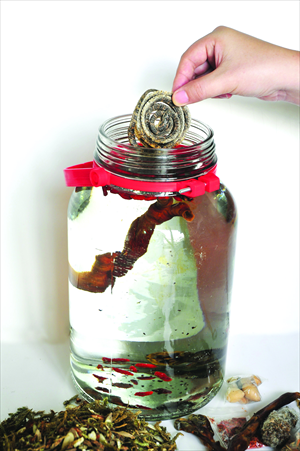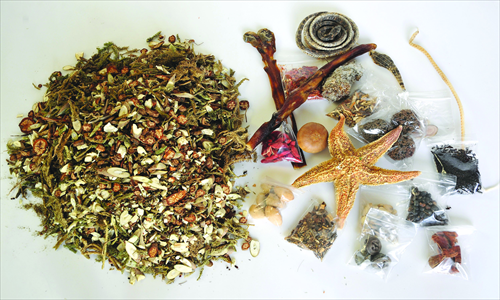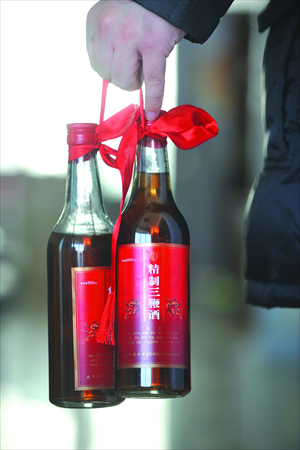Drink to your health



If a Chinese friend pours you a drink from a big jar of brown fluid with a snake or some animal parts in it, go ahead and try it, for the sake of your health.
It's not a trendy cocktail, but a jar of home-made Traditional Chinese Medicine (TCM) alcohol, called yaojiu.
The liquor usually has a color of light amber, and gives out a strong odor of alcohol and a rich aroma of herbs.
It tastes bitter and spicy in your mouth, with a mellow aftertaste and a subtle sweetness which makes the sharp taste of the medicine almost unnoticeable. Later you'll feel warmth in the stomach that will soon spread all over your body.
"It'll have a powerful kick later on the drinker, so a small dose of 25 milliliters each time will be enough," said Shu Wanting, 41, a TCM doctor with 10 years of experience in treating diseases using medicinal wine. Her specialty is "health and longevity," known as yangsheng in Chinese.
Sexy and intoxicating
According to Shu, Chinese people who drink medicinal liquor have two main purposes - to live longer and healthier, or to cure a chronic disease, such as rheumatism or kidney problems.
There are many varieties of medicinal liquor, with different materials steeped inside, including plants and animal body parts.
The most famous and popular types include ginseng wine, fleece-flower root wine, velvet antler (the horn of a deer) wine, tiger bones wine, five-snake wine and three-penis wine.
Among those, the three-penis wine, or sanbianjiu, attracts the most curiosity.
It is believed that the liquor, usually made with the penises of dogs, stags and bulls, can enhance body strength and improve sexual performance, by activating the blood circulation and promoting the flow of qi, the fundamental life force or energy in Chinese medicine.
Shu said that taking this aphrodisiac wine can be effective at first, but noted that long-term usage could be harmful. "Since qi in the human body is limited, premature withdrawal of qi is not a solution," she said.
Snake wine is made with several kinds of poisonous snakes to cure rheumatism and skin diseases.
So is the liquor poison? Actually, snake venom is essentially proteases, which will lose their toxicity in organic solvents with high concentrations of alcohol, according to Ma Hongyi, 32, another yaojiu expert.
Time-honored and valued
Ma runs an online store called Jiutouchong, selling yaojiu made according to formulas handed down from his ancestors.
In fact, making medicinal alcohol has been a time-honored tradition in China since the Shang Dynasty (C.1600-1046BC). Other Asian countries, such as Japan, South Korea and Vietnam, also share this method of keeping healthy and curing diseases.
In TCM theories, alcohol ranks best of all medicinal materials, and the combination of alcohol and medicines can enhance the efficacy of the drug.
Shu told the Global Times that alcohol is good solvent, so active elements can be easily separated and dissolved into the fluid. "The alcohol goes directly into the blood, which brings the medicines into action immediately," Shu noted.
Many Chinese buy medicinal alcohol from stores, and many make it on their own, such as Joyce Duan, 26, a Chinese calligraphy teacher.
Several months ago, Duan took her husband, who suffers a constant pain in his knee joints, to a TCM doctor for advice. The doctor wrote out a prescription and told them to make medicinal liquor according to the formula.
So Duan followed the doctor's instructions to the letter. She put exactly 10 grams of corydalis tuber, 20 grams of cyathula roots, 10 grams of safflower, and other medicinal ingredients, into 1.5 liters of baijiu (white liquor) and kept it for three months.
The liquor turned out to be very effective for relieving her husband's pains, and it also cured several other of Duan's family members who suffered from rheumatism.
Carefully made and enjoyed
Neither as bitter as the traditional herbal medicines, nor as harmful as the modern treatment of intramuscular injections, a cup of mellow, fragrant medicinal wine seems to be a good choice. But experts warn it is not for everyone.
"It's very risky for pregnant women and people who are taking certain medicines to drink yaojiu," Ma said.
"The best timing is before each meal, and the best dose is 25 milliliters, not too much," Shu noted.
Additionally, people should know their own physical conditions and choose a suitable wine with the right ingredients.
"For example, if you're a young man in full vigor, wine with deer horns, which easily causes nose bleeding, is probably not a good idea," said Shu.
Shu also suggests that, to make some on your own, getting a prescription from TCM doctor is the first thing to do.
Steep the materials in 45 percent alcohol baijiu, and avoid direct sunshine. One or two months will be enough for steeping botanical medicines, but animal parts need more time.
Since the autumn is a season of "toxic heat and dryness" in TCM theories, people should be extra careful in drinking yaojiu, according to Shu.
"These days liquor that is made to nourish yin by boosting body fluids and nourishing the blood, such as wine with dendrobium species inside, is preferred," Shu added.